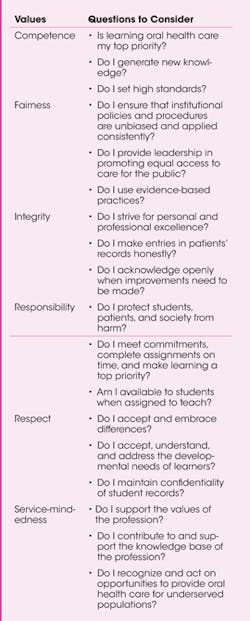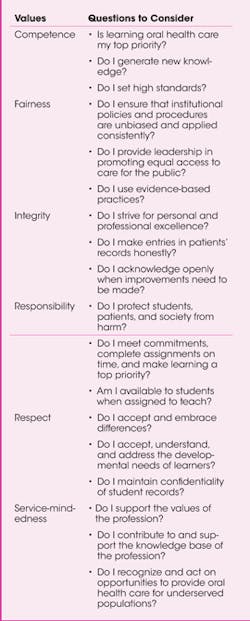Professionalism among educators
It is important to take a moment to salute our dental hygiene educators. These individuals work diligently to prepare the health-care providers of the future. I cannot speak highly enough of what they do, and I know that many of you reflect back on your education and can identify someone special who mentored you and helped you forge your career in oral health care. You would not be the same person without that dental hygiene educator.
Recently, the chairperson of our department asked the faculty to evaluate our own performance as educators, using a new tool provided by the American Dental Education Association (ADEA). This tool is called the "ADEA Tool for Action on Professionalism in Dental Education" and is available at www.adea.org.
Within this tool there are six values defining professionalism in dental education. They include: competence, fairness, integrity, responsibility, respect, and service-mindedness. These core values are described as follows.1
- Competence: Acquiring and maintaining the high level of special knowledge, technical ability, and professional behavior necessary for the provision of clinical care to patients and for effective functioning in the dental education environment.
- Fairness: Demonstrating consistency and even-handedness in dealings with others.
- Integrity: Being honest and demonstrating congruence between one's values, words, and actions.
- Responsibility: Being accountable for one's actions and recognizing and acting upon the special obligations to others that one assumes in joining a profession.
- Respect: Honoring the worth of others.
- Service-mindedness: Acting for the benefit of the patients and the public we serve, and approaching those served with compassion.
In each category, there are questions posed for the individual to use to assess their abilities. Some of these questions from this document appear in the following table.1
There are many other questions that are posed within these six categories of professionalism, but I wanted you to get a flavor for the level of expectations set for educators. Knowledge and clinical expertise are not enough to sustain one in a teaching position. We strive for more and demand more of ourselves, as do our students, colleagues, and institutional administrators.
While considering my own abilities in terms of professionalism, it occurred to me that these six values are not unique to that of an educator. They can apply to other roles of the dental hygienist. All we have to do is substitute student for patient or client, and we can examine our own professionalism as it relates to our particular job setting and practices.
I have met many colleagues in oral health care who pride themselves on their knowledge and clinical expertise. And they go far beyond that. It is their professionalism they value and talk about routinely. So, if professionalism is an important consideration, how is it acknowledged and rewarded? Is this merely an expectation or does one get points for professionalism? Is lack of professionalism a deal breaker for keeping a job? Is it overtly represented in your discussions when you have those evaluations or is this something that is part of a hidden agenda? Are you offered a raise or merit increase because of professionalism?
How do we learn professionalism? Is this something our teachers sit down with us and talk about in class? Do they identify the specific values they want to see demonstrated? Are students taught professionalism development? Or, again, is this a covert expectation? Do we absorb this through observation?
This reflection activity may be a worthwhile endeavor for all of us to embrace. It is always a good idea to take a moment on occasion and look within as well as outside ourselves. If these are the values and behaviors we desire, let us make that a known and a substantive part of the education experience for both faculty and students. We get only so much time to impart a wealth of information to our students. Let's show them where this fits into their role as health-care provider. RDH
Reference:
1. ADEA Tool for Action on Professionalism in Dental Education. Available at: http://www.adea.org/policy_advocacy/ethics_professionalism/documents/adeatoolforaction.pdf 7/27/2012. Accessed November 28, 2012.
JOANN R. GURENLIAN, RDH, PhD, is president of Gurenlian & Associates, and provides consulting services and continuing-education programs to health-care providers. She is a professor and interim dental hygiene graduate program director at Idaho State University and president-elect of the International Federation of Dental Hygienists.
Consider reading:Are you protecting your license?
Consider reading:How dental hygienists should plot their 2013 goals
Consider reading:What is an ideal dental practice?
Past RDH Issues

